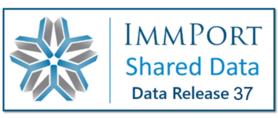
ImmPort’s latest shared data release contains high-quality immunology data covering a variety of focus areas, including new COVID-19 data, influenza-related data, an inflammatory arthritis study, and malaria vaccine-related clinical trial data. Additionally, there are 9 new studies related to preterm birth, spanning subject areas from the microbiome, to transcriptomic profiling, and more. Studies shared during Data Release 37 include: • SDY1680 Flow Cytometry of T Cells from Hospitalized or Ambulatory Adults with Respiratory Viral Infections COVID-19 Cohort
A primary mission of ImmPort is to promote rapid availability of data associated with important findings via a trusted open access platform. ImmPort’s latest release of data contains high-quality immunological findings related to COVID-19, as well as other significant studies in the field of immunology. Studies shared during this data release include: • SDY1655 Longitudinal Analyses Reveal Immunological Misfiring in Severe COVID-19, PI: Akiko Iwasaki - Yale School of Medicine
In the midst of a global pandemic, sharing of scientific data is critical to increasing our collective understanding of SARS-CoV-2 and the resultant disease caused by the virus, COVID-19. We’d like to thank the researchers who are currently sharing their data through the ImmPort platform, and we stand ready to support the scientific community’s future data sharing and processing needs. ImmPort’s latest data release includes 13 new studies and 2 updated studies, covering a wide range of focus areas including COVID-19, organ transplantation, auto-immune disease, influenza, cancer, and preterm birth.
Our collective understanding of the immune system is constantly expanding as more and more high-quality studies are published each day. At ImmPort, we are proud to provide a platform that preserves this data for re-use by the greater scientific community. Recently, 9 new studies were added to ImmPort and 5 existing studies were updated, bringing ImmPort’s total study count to 422. ImmPort now contains high quality immunological-related data for over 58,000 subjects representing over 5 million experimental results.

Our hearts and minds are with all impacted by COVID-19, and we’d like to ensure those in the research community are aware of the high quality immunological data available for immediate use in ImmPort. ImmPort is a robust data repository sponsored by the National Institutes of Health (NIH), National Institute of Allergy and Infectious Disease (NIAID). Data within ImmPort has been generated largely through clinical trials and research studies funded by the NIH and other public-private partnerships, and all data is freely available for re-use.
With 22 new studies and 21 updated studies, the latest release of ImmPort contains a wealth of high quality data, all free for re-use. This major release contains data from over 2,700 subjects and covers a wide range of research areas such as food allergies, organ and islet transplantation, lupus, HIV, chikungunya, and vaccine response for influenza and pertussis. Of the 22 new studies, 6 come from the Consortium for Food Allergy Research (CoFAR) and contain data from 1,587 subjects.
ImmPort is always thrilled to support bioinformatics and big data researchers around the world. In just such an instance, ImmPort Science Program Lead Sanchita Bhattacharya, @SanchitaB, from the Bakar Institute of Computational Health Sciences, UCSF, will be teaching during the 6th International BigDat 2020 program in Ancona, Italy. BigDat 2020 is a research training event with a focus on updating participants on the latest advances in big data utilization and sub-areas such as infrastructure, management, search and mining, security and privacy, and applications.
Findable, Accessible, Interoperable, and Responsible (FAIR) data principals are at the core of ImmPort’s mission. This driving force intersects well with another force, FORCE11 that is, which stands for the Future of Research Communications and e-Scholarship, a group founded in 2011 to “improve research practices by supporting innovations in the ways knowledge is created and shared across research disciplines, communities, sectors and timeframes.” ImmPort’s own Scientific Program Director, Dr. Sanchita Bhattacharya @SanchitaB, was honored to share a poster presentation during FORCE11’s annual conference in Edinbough, Scotland.
What if clinicians could understand earlier in pregnancy which mothers are developing preeclampsia, far before any clinical symptoms emerge? A team of researchers discovered that a set of eight cell-specific immune features from a maternal blood sample accurately predicted the onset of preeclampsia well before traditional clinical signs appeared. These results are captured in ImmPort study SDY1528, and are as always, freely available for download and re-use. Preeclampsia is a leading cause of maternal death and preterm birth, however early diagnosis has been challenging.
What conditions do living donors experience in the years following solid-organ donation? This is a question immTransplant seeks to understand using data from 27 clinical studies in the ImmPort database. By providing this information in an open access format, researchers can leverage the data to understand which conditions living donors may experience up to 40 years down the road. Additionally, a trajectory network map shows relationships between conditions; for example, how frequently one condition progresses to another.
aai amp antibiotics arthritis bhattacharya big-data bigdat bioinformatics biomarkers chikv clinical-trials coronavirus covid-19 covid-19-datasets cyto cytof cytokine cytometry data-analytics data-visualization deep-learning dr29rel elisa epitopes fair flow-cytometry focis food-allergies force11 gene-expression gut-microbiome h1n1 hipc iedb immport immport-data immtransplant immune-signatures immunology influenza islet-transplant living-kidney-donors malaria march-of-dimes melanoma metacyto microbiome natural-killer-cells organ-transplant organ-transplantation pratip-chattopadhyay preeclampsia preterm-birth q-pcr rna-sequencing sars-cov-2 t-cells transcriptomics ucsf vaccine vaccine-response
